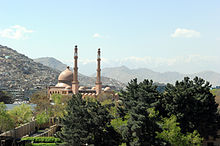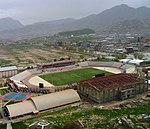Sport in Afghanistan
 From Wikipedia - Reading time: 11 min
From Wikipedia - Reading time: 11 min
| Part of a series on the |
| Culture of Afghanistan |
|---|
 |
| History |
| People |
| Languages |
| Mythology |
| Cuisine |
| Festivals |
| Religion |
| Sport |
Sport in Afghanistan is managed by the General Directorate of Olympics, Physical Education and Sports, currently headed by Ahmadullah Wasiq.[1] Currently, cricket and association football (soccer) are the most popular sports in Afghanistan.[2][3][4] The Afghan Sports Federation has promoted many types of sports, including basketball, bodybuilding, boxing, bowling, cricket, football, golf, mountaineering, paragliding, skating, skiing, snooker, taekwondo, track and field, volleyball, and weightlifting.[5][6] The traditional sport of Afghanistan has been Buzkashi, which is now occasionally seen in the northern parts of the country.[7][8]
The Afghanistan national cricket team's win over Namibia in Krugersdorp earned them official One Day International status in April 2009. The Afghanistan Cricket Board is Afghanistan's representative at the International Cricket Council and was an associate member of ICC from June 2013 to 2017. It is also a member of the Asian Cricket Council. Afghanistan became a full member of the International Cricket Council on 22 June 2017, entitling the national team to participate in official Test matches.
Basketball
[edit]Basketball was first played in Afghanistan in 1936. In 1966, the Afghanistan National Olympic Committee (ANOC) founded the Afghanistan national basketball team after receiving challenges from India and Pakistan.[9]
Bodybuilding
[edit]Bodybuilding is widely enjoyed in Afghanistan, and the country is a member of the International Federation of BodyBuilding and Fitness (IFBB). An Afghan by the name of Ali Reza Asahi won a gold medal in the 2023 World Bodybuilding Championships, which was held in Seoul, South Korea.[10] Another named Mohammad Ayoub Azami won a silver medal in the same competition.[11][12] Ahmad Yasin Salik Qaderi ("Mr. Muscles") became the overall winner of the 2017 WBPF World Championship, which was held in Ulaanbaatar, Mongolia.[13][14][15]
Cricket
[edit]
Cricket is one of the most popular sports in Afghanistan. The Afghanistan national cricket team's win over Namibia in Krugersdorp earned them official One Day International status in April 2009. The Afghanistan Cricket Board is Afghanistan's representative at the International Cricket Council and was an associate member of ICC from June 2013 to 2017. It is also a member of the Asian Cricket Council. Afghanistan became a full member of the International Cricket Council on 22 June 2017, entitling the national team to participate in official Test matches. There are 320 cricket clubs and 6 turf wickets in Afghanistan.[16]
The Afghanistan national cricket team have qualified for the last 3 Cricket World Cup tournaments. The last being in 2023.[17][18] On 28 December 2019, Rashid Khan was named the ICC Men’s T20I Cricketer of the Decade and in the ICC Men’s T20I Team of the Decade.
Football
[edit]
The Afghanistan national football team was formed in 1922, joining FIFA in 1948 and the Asian Football Confederation (AFC) in 1954. Afghanistan's only appearance and first FIFA international match was at the Olympic Games football tournament in the 1948 Summer Olympic Games when they played Luxembourg on 26 July 1948 and lost 6–0. Although it did not play in any international games from 1984 to 2003 due to internal conflicts, it is striving to improve its world ranking.[19][20] The national stadium, which was built during the reign of King Amanullah Khan, has been used for football matches between teams from different provinces of the country as well as neighboring countries. In the national level, football matches are played between provinces or regions.[21]
The country’s first international trophy was achieved in the 2013 edition of the SAFF Championship.
Mixed martial arts
[edit]Afghans have taken a recent interest in mixed martial arts (MMA).[22][23][24][25][26][27] There are several gyms in Afghanistan which promote the sport and have fighters. Siyar Bahadurzada is an Afghan MMA fighter who competes in the Ultimate Fighting Championship. He was known for holding and wearing the Afghan flag around himself before and after his professional fights.
Javid Basharat and Farid Basharat became the first brother tandem to compete in the same division in the UFC. Other popular Afghan MMA fighters include Baz Mohammad and Mubariz.[28][29][30][31]
Taekwondo
[edit]The sport of taekwondo has thrived in Afghanistan in the last two decades. Some of the Afghan taekwondo practitioners include Bashir Taraki, Farzad Mansouri, Hussain Sadiqi, Mohsen Rezaee, Rohullah Nikpai, and Zakia Khudadadi.[32]
Nikpai's medal tally summary in the Olympics:
- Bronze in 2008 Olympics
- Bronze in 2012 Olympics
Other sports
[edit]Other sports in which Afghans participate include boxing, bowling, buzkashi, futsal, judo, kickboxing, mountaineering, paragliding, rugby, sandrailling, skating, skiing, swimming, team handball, track and field, volleyball, weightlifting, and a number of others.[7][33][5][34][35][6][36] Saleh Mohammad is a professional Afghan snooker player, who previously represented Pakistan in international competitions but is now representing Afghanistan.[37]
Afghanistan also became a member of the Federation of International Bandy in 2012.[38][39]
In 2015 Afghanistan held its first marathon; among those who ran the entire marathon was one woman, Zainab, age 25, who thus became the first Afghan woman to run in a marathon within her own country.[40]
Stadiums and gymnasiums
[edit]
There are small sized football stadiums in most major cities of Afghanistan, which were built before the 1970s and they lack modern seatings. They will only improve once more if people turn to sport and the nation's economy picks up, including the security situation and proper investors are found. The then-President of the Afghanistan Cricket Board, Omar Zakhilwal, announced in 2010 that the government was planning to construct standard cricket grounds in all 34 provinces in the next two years.[41][42][43][44][45]
The following are some of the major stadiums in Afghanistan:
- Ghazi Amanullah International Cricket Stadium in Nangarhar Province
- Ghazi Stadium in Kabul
- Kabul National Cricket Stadium in Kabul[46]
- Kandahar International Cricket Stadium in Kandahar[47]
- Kandahar Football Stadium
- Laghman Cricket Stadium in Laghman Province[48]
- Sherzai Cricket Stadium in Jalalabad
By capacity:
| # | Name | Location | Capacity | Sport | Image |
|---|---|---|---|---|---|
| 1 | Ghazi Stadium | Kabul | 25,000 | Association football | 
|
| 2 | Ahmad Shahi Stadium | Kandahar | 20,000 | Association football | |
| 3 | Ghazi Amanullah International Cricket Stadium | Jalalabad | 14,000 | Cricket | |
| 4 | Kandahar International Cricket Stadium | Kandahar | 14,000 | Cricket | |
| 5 | Khost Cricket Stadium | Khost | 6,000 | Cricket |
See also
[edit]References
[edit]- ^ https://tolonews.com/index.php/afghanistan-188794
- ^ "World Cup 2023: Afghanistan's dazzling run captivates cricket". BBC News. 8 November 2023. Retrieved 2023-11-14.
- ^ "Afghanistan's cricket team under fire as players meet with Taliban and say 'politics' shouldn't stop sports". CBS News. January 17, 2023. Retrieved 2023-11-14.
- ^ "Photo". i.imgur.com. Retrieved 2019-12-28.
- ^ a b "Second round of Kickboxing competitions held in Mazar-i-Sharif". Pajhwok Afghan News. 9 March 2024. Retrieved 2024-03-17.
- ^ a b مسابقات ملی اسکی در بامیان با قهرمانی ورزشکاران این ولایت به پایان رسید on YouTube
- ^ a b "Buzkashi League final: Sar-i-Pul emerges victorious". Pajhwok Afghan News. 5 January 2024. Retrieved 2024-03-17.
- ^ "Sports in Afghanistan". March 5, 2018.
- ^ D'Hippolito, Joseph (July 28, 2011). "The Trials of Team Afghanistan". The New York Times. Retrieved 2023-11-15.
- ^ "Afghan athlete wins gold at World Bodybuilding Championships". Ariana News. November 9, 2023. Retrieved 2023-11-14.
- ^ "Afghan bodybuilder wins silver medal in global contest". Pajhwok Afghan News. 11 November 2023. Retrieved 2023-11-14.
- ^ "Ali Reza Asahi wins World Bodybuilding Championship in South Korea". Khaama Press. November 9, 2023. Retrieved 2023-11-14.
- ^ "Afghan Athlete Yasin Qaderi Wins Gold At World Amateur Championships". Ariana News. October 8, 2017. Retrieved 2023-11-14.
- ^ "Mr Afghanistan Wins Gold At World Amateur Championships". TOLOnews. 8 October 2017. Retrieved 2023-11-14.
- ^ "Afghan bodybuilder becomes overall champion at world event in Mongolia". 1tvnews.af. Archived from the original on 9 October 2017. Retrieved 13 January 2022.
- ^ "Profile of Afghanistan". Asian Cricket Council. Retrieved 10 July 2014.
- ^ "Afghanistan Ends Unprecedented World Cup Journey". TOLOnews. 10 November 2023. Retrieved 2023-11-14.
- ^ "Afghanistan's dazzling World Cup 2023 run captivates cricket". Ariana News. November 9, 2023. Retrieved 2023-11-14.
- ^ "2nd qualifying round for FIFA WC: Afghan squad off to Qatar". Pajhwok Afghan News. 14 November 2023. Retrieved 2023-11-14.
- ^ "Qatar calls up 26-man squad for World Cup and AFC qualifiers". Doha News. November 9, 2023. Retrieved 2023-11-14.
- ^ Farmer, Ben (28 September 2012). "Afghanistan launches first professional football league". Kabul: The Telegraph. Retrieved 2012-09-29.
- ^ "Afghan MMA fighter knocks out Turkish opponent". Pajhwok Afghan News. 26 June 2023. Retrieved 2023-11-14.
- ^ "Afghan MMA fighter Farid Besharat defeats his American rival". Ariana News. March 5, 2023. Retrieved 2023-11-14.
- ^ "Afghan MMA fighter defeats his American rival". Ariana News. February 27, 2023. Retrieved 2023-11-14.
- ^ "Pakistani MMA fighters compete in Afghanistan". Ariana News. January 23, 2022. Retrieved 2023-11-14.
- ^ "Afghan MMA fighter defeats his Russian rival". Ariana News. April 7, 2021. Retrieved 2023-11-14.
- ^ "Afghan MMA Fighter Defeats Russian Opponent". Ariana News. December 29, 2019. Retrieved 2023-11-14.
- ^ "Afghan MMA Fighter Mubriz Defeats His Ukrainian Rival". TOLOnews. 9 April 2021. Retrieved 2023-11-14.
- ^ "President confers Masjidi Khan Award on Mubariz". Pajhwok Afghan News. 31 March 2016. Retrieved 2023-11-14.
- ^ "Afghan Mubariz defeats Russian MMA fighter". Ariana News. May 9, 2016. Retrieved 2023-11-14.
- ^ "Afghan MMA fighter defeats his American opponent". Ariana News. August 9, 2020. Retrieved 2023-11-14.
- ^ "Zakia Khudadadi qualifies for Paris Paralympic Games". Pajhwok Afghan News. 9 March 2024. Retrieved 2024-03-17.
- ^ "Ramadan Cup futsal tournament kicks off in Daikundi". Pajhwok Afghan News. 11 March 2024. Retrieved 2024-03-17.
- ^ "Local mountaineer becomes first Afghan to summit Mount Everest". Ariana News. May 18, 2023. Retrieved 2024-03-17.
- ^ Meet Afghanistan's First Female Paraglider on YouTube (Voice of America, June 29, 2018)
- ^ "Afghan swimmer finishes second in Philippines contests". Pajhwok Afghan News. 28 February 2024. Retrieved 2024-03-17.
- ^ "Saleh keen to develop snooker in Afghanistan". Gulf News. November 20, 2010.
- ^ "Google Translate". translate.google.com.
- ^ "Members | Federation of International Bandy". www.worldbandy.com. Archived from the original on 12 October 2016. Retrieved 13 January 2022.
- ^ "Afghan Woman Runs in Country's First Marathon". Feminist.org. 2015-10-29. Retrieved 2015-11-02.
- ^ Pajhwok Afghan News - All provinces to have cricket grounds: minister. October 11, 2010.
- ^ "ACB To Build New Cricket Grounds". TOLOnews. 6 July 2017. Retrieved 2024-03-17.
- ^ "Construction work on Qalat cricket stadium resumes". Pajhwok Afghan News. 23 April 2018. Retrieved 2024-03-17.
- ^ "Foundation stone of Paktika cricket stadium laid". Pajhwok Afghan News. 22 February 2018. Retrieved 2024-03-17.
- ^ "Cricket grounds being built in Helmand, Zabul". Pajhwok Afghan News. 11 June 2017. Retrieved 2024-03-17.
- ^ "Ghani allocates land in Kabul for new cricket stadium". Ariana News. December 20, 2020. Retrieved 2024-03-17.
- ^ "Kandahar Gets New Cricket Stadium, Thanks To India". TOLOnews. 3 April 2018. Retrieved 2024-03-17.
- ^ "Work on Laghman cricket stadium being completed: ACB". Pajhwok Afghan News. 26 February 2024. Retrieved 2024-03-17.
 KSF
KSF